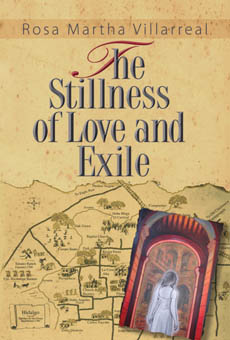Rosa Martha Villarreal’s The Stillness of Love and Exile
Love, Magic, and Miracles
Whenever we tell a story, the tale weaves from the past through the present and into the future. In fiction, those different realities-varying possibilities of what is and what could be-overlap through methods both magical and meaningful. Engrossed in the pages of a novel, the reader travels through time.
In the tradition of Gabriel Garc-a M¡rquez, acclaimed California-based novelist Rosa Martha Villarreal’s third novel, The Stillness of Love and Exile, makes the reader believe time travel is possible, not through a contraption or a machine but through the fluid nature of reality. In pursuit of her story, Villarreal leads her readers through a score of triumphant manifestations of love that range across place and time. “Things in the past are still relevant, still happening in the lives of the people,” said Villarreal of the characters in her fictional Mexican town of Hidalgo. This relevance of the past to the present becomes nearly tangible when the dead visit the living.

While the past can sometimes cast a shadow over the present, it can also serve as a source of beauty and even passion, a vehicle for calling forth individual desires. Our ultimate exploration, Villarreal insists, is to uncover and experience what she calls the “formless desire within all of us.” “It is part of our journey,” Villarreal stated, “to find that desire and fulfill it.” Stumbling along the path, we find our desires through joy and sorrow, or by calling people and events to us, as do the characters in Stillness. It is through personal tragedy that Lilia, the story’s heroine, finds the courage to uncover her own desires, propelling her forward out of what may have been a dull existence, traversing tragedy to find triumph and ultimately love.
While it may be tempting to pigeonhole Villarreal’s fiction, she intends her work to have a universal appeal. “You don’t have to be Hispanic,” she said, to feel the impact of Hispanic culture throughout California and the southwest. These unconscious influences of cultural context serve to draw in the reader.

But Villarreal’s work engages beyond merely making one want to keep turning the pages. There are times in her work when ambiguity reigns, and the reader is left to draw his or her own conclusions about what is real and what is illusory. “Is the magical part of life the reality we don’t accept? Is magic just a superstition? Do we exile the possibility of magic and miracle?” are just some of the questions Villarreal asks. In Stillness, Lilia returns from exile so that lost love, magic, and miracle can be brought to the forefront of a story that ends with desire.



